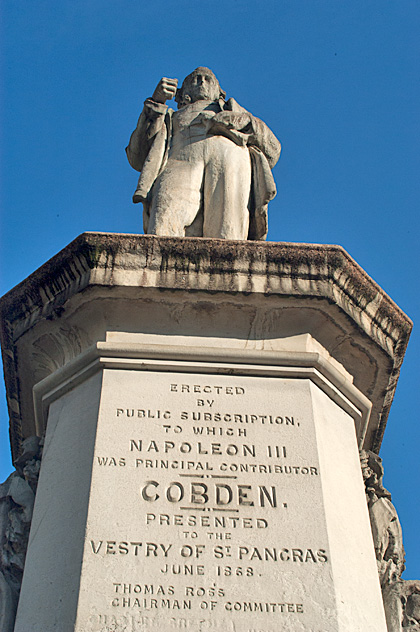MEMORIALS |
RICHARD COBDEN Richard Cobden was born in Heyshott, near Midhurst, Sussex, on 3 June 1804, one of eleven children of an unsuccessful small farmer. After poor education at a Dickensian boarding school in Yorkshire, he began work at 14 in his uncle’s textile warehouse in London. He quickly developed a knowledge of the cotton trade, and by 1828, with two others, started a company selling calico prints, which was successful enough for Cobden to move to a comfortable house in Manchester by 1832. Cobden could also afford to travel widely in Europe and even go to America. As ‘A Manchester Manufacturer’, he published two tracts, England, Ireland and America (1835) and Russia (1836), which criticised British foreign policy as serving the interests of the court, the aristocracy and the armed forces, but burdening ordinary people with excessive taxation to finance military adventurism. He was also critical of British handling of the government of Ireland. At a local level, Cobden played a part in Manchester’s obtaining incorporation as a borough, meaning that it could elect its own council to run its affairs, Cobden being elected one of the first aldermen in 1838. This led on to his involvement in the campaign against the Corn Laws, a protection of British rural interests whereby tax had to be paid on imported wheat, raising the price of bread, a staple of diet for the poor. The Anti-Corn Law League’s consistently non-violent agitation finally brought about repeal in 1846. Meanwhile, Cobden had been elected MP for Stockport in 1841, moving to the seat of West Riding in 1847, and with his oratorical skills he again toured Europe as the ‘Apostle of Free Trade’, which he identified, together with political democracy, as integral to the cause of peace. He supported both the Peace Society and the series of international peace congresses over 1848-53. In particular, he represented a gradual shift in Peace Society ideology from its early predominance of individual absolute pacifism and personal renunciation of war to the mid-19th century and later emphasis on international arbitration and treaties as a means of resolving disputes and attempting to avoid future wars, though the Society never precluded membership from either tendency. Cobden campaigned against loans for standing armaments, and in 1849 urged the government to adopt compulsory arbitration in international disputes. In 1853 he published a pamphlet, How Wars are got up in India: the origin of the Burmese War. He joined with his fellow radical MP John Bright in campaigning vigorously against the Crimean War, 1854-56, leading to much abuse by the press, and even accusations of treason. Cobden attempted to counter this by setting up a pro-peace newspaper, the Morning Star, in 1856, but such was the transient popularity of the war that both MPs lost their seats in the 1857 election; by 1859, however, Cobden had been forgiven and was elected at Rochdale. The Prime Minister, Lord Palmerston, offered Cobden a government post, but he refused to serve under the man who had taken the country to war in the Crimea (he had previously refused an offer from Lord John Russell in 1846). He agreed, however, to act for William Gladstone, Chancellor of the Exchequer, in late 1859 in negotiating the Anglo-French trade treaty of 1860, averting the danger of a panic-fed war. but refused the baronetcy offered as a reward. Cobden continued to urge arbitration treaties and the reform of international law, a theme accentuated by his concern to prevent British intervention in the American civil war, even though morally he sided with Abraham Lincoln against the Confederate rebellion. He published yet another influential tract in 1862, The Three Panics, but his campaigning was cut short by his death from acute bronchitis on 2 April 1865. |
 |
|
|
RICHARD COBBDEN Mornington Crescent, London | location |
|||
|
The following year the Cobden Club was founded to further his internationalist ideas, which remained influential for many years. In 1916, two prominent activists in the struggle on behalf of First World War conscientious objectors, Margaret Hobhouse and Clara Cole, were convicted under the Defence of the Realm Act for distributing a leaflet including an 1854 Parliamentary comment by Cobden on the Crimean War. As late as the 1920s, Cobden’s original home at Heyshott, Dunford House, was transformed into a conference centre to continue the critique of official foreign policy. |
|||
Peace Pledge Union, 1 Peace Passage, London N7 0BT. Tel +44 (0)20 7424 9444 contact | where to find us
